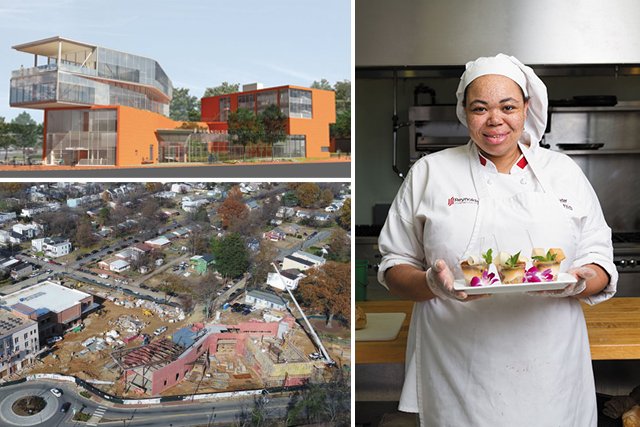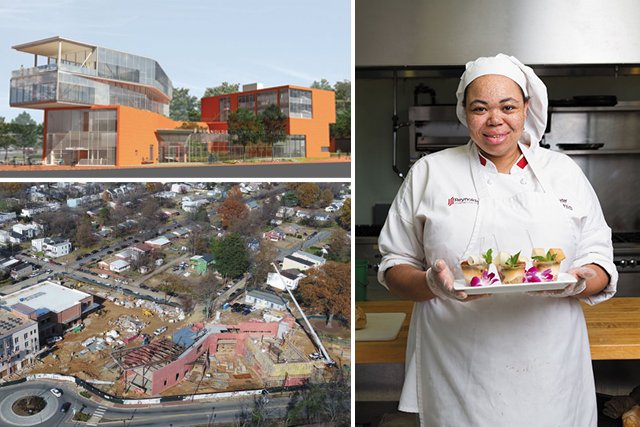
“Our students aren’t your typical type of student,” explains Jesse Miller, who has been a culinary instructor at Reynolds Community College for 10 years. The culinary school’s average student is in their early 20s, has no previous kitchen experience and is balancing school with other responsibilities. Most students take up to five years to complete their associate degree.
To address this reality, Reynolds is moving its culinary school, changing its curriculum and rebranding. “The Kitchens at Reynolds” are expected to open in October and start classes in January for the spring 2020 semester.
The new 25,000-square-foot campus at 25th Street and Nine Mile Road will serve as an anchor for The Market at 25th, a grocery store expected to open March 28. Together, the store and culinary school will be able to provide access to high-quality food, workforce training and job development. The Kitchens can accommodate 350 culinary students and envision serving students from Culinard, the for-profit culinary college that closed abruptly in December.
The changes are the result of four years of extensive research, focus groups and community conversations that led to the conclusion that the almost 30-year-old program needed to grow, respond to changes in the culinary world, and answer the need for culinary professionals in the area, while also providing a streamlined hub for students with a community connection. With a third of all culinary students living in the East End, location was key.
“We needed to be in the city — our food-town destination is really Richmond city,” says Elizabeth S. Littlefield, vice president for institutional advancement and strategic partnerships at Reynolds.
Passersby will be able to catch a glimpse of the culinary students in action via the windows of the street-level kitchen — students will no longer be on the sixth floor of a building downtown.
“We needed people to be able to walk by and see students,” Littlefield says. “This fuels a bigger vision of an economic engine.”
The culinary curriculum will include courses on retail grocery, nutrition and dietary specialization, sustainability, food trucks, catering, and urban agriculture.
“You can go anywhere and learn a recipe,” Miller says. “We’re teaching a foundation.”
The culinary associate degree has been broken into four sections, each building off the previous, giving students the freedom to start and stop their degrees without losing time and money. It also opens the doors for alumni who may want to “keep climbing the chain,” Miller says.
A market cafe, located inside The Kitchens, will allow students to gain work experience; an on-site greenhouse will provide a pathway to urban gardening and farm-to-table exercises — currently, students travel to Goochland for the curriculum’s agricultural component. And in the 72-seat, tiered demo kitchen, students can record lessons, and community members can attend workshops and information sessions. Eventually students will cook three-course, donation-based dinners open to the community in the 54-seat dining room, which will also be used for fundraisers and other events.
An internship database will allow students and local businesses to create profiles and connect with one another, while also tracking internship or volunteer hours. When students have completed their internships, they may change their status to job-seeker.
“We’re integrating education and industry so there’s not a gap, or as big of a gap,” Miller says. “We want it to be seamless.”
About 30 businesses have partnered with the school to date, including The Jefferson Hotel, The Country Club of Virginia, Shamin Hotels, Pasture and Shula’s. Miller says past graduates have gone on to work for The Inn at Little Washington and David Chang’s Momofuku CCDC in Washington, D.C., including 23-year-old Denton Taylor, who says he doesn’t think he’d be a chef at the acclaimed restaurant without his experience at culinary school.
“It instilled a greater passion, work ethic and knowledge that really pushed me,” he says. “It helped me learn behind-the-scenes knowledge I wouldn’t have had the chance to [learn] going [straight] into the industry.”
Miller, an industry veteran, says Reynolds’ culinary program doesn’t throw students into the fire, but instead gives them time to form a foundation. “I think that’s what benefits students — to mess up in a nonthreatening environment,” he says, “their ability to come in and experience that from people who want to get you to where you want to go and refine what you really want to do.”

